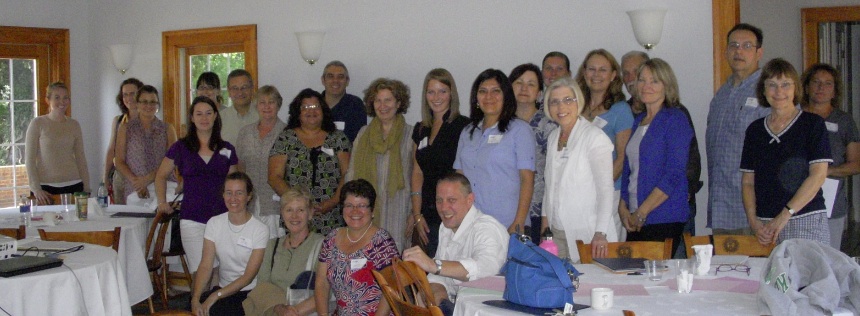In Italy, a teenager finishing high school with the goal of continuing on with a university degree must immediately choose the kind of path and career she/he would like to take. At 19 years old, in my home country one may already start law or medical school, or, as in the US, can study political science, biology, literature, philosophy, history, foreign languages, chemistry, journalism, business, mathematics, etc. When it was my turn – several years ago – I was not really sure what I wanted to study. I remember that I attended a dinner with my mother’s colleagues at the high school where she taught (she is now retired) and I revealed my concerns about my university path to my neighbors at the table. One of them asked me: “What is your biggest desire?” I immediately responded: “I want to travel, I want to meet people from different countries and different cultures.” Very calmly, she said: “So, study languages.” I ended up studying Russian and French at the University of Florence, Tuscany, and as a consequence, I have traveled a lot, communicating with people in their native languages, comprehending their cultures and their ways of being. This path opened my mind to the beauty of our world. It is the reason why I now teach Italian in the US – a foreign language here – and I do so with the same passion that I felt when I was subsequently learning other languages, including English.
The passion that I have is shared by my colleagues who teach languages such as French, German, Italian, Russian, and Spanish, at various levels from Middle (or even Elementary) School to High School to College. Across our diverse curricula it is time for change so that our journeys become even more effective and understood by all those involved (students, parents, colleagues from other disciplines, and administrators). For this reason, SUNY Fredonia’s Department of Modern Languages and Literatures, chaired by Dr. Carmen Rivera, launched the initiative “Dreaming in Languages: Teaching and Learning in the 21st Century” through a Task Force established last spring, chaired by my colleague, Professor of Spanish, Dr. Juan De Urda, with myself serving as co-chair. With the encouragement of some administrators, our discussions and reflections focus on possible changes to the General Education requirement for Foreign Language since we believe that our students should be able to be proficient in at least a foreign language as a passport to this increasingly globalized world. We have opened a blog (http://modernlanguagesfredonia.wordpress.com/) to invite students, colleagues, administrators, and friends to become involved in the process since it requires a concerted effort to redefine the position of foreign languages in higher education that can also be spread to all levels.For this purpose, we believed and still truly trust that the discussion should be made as transparent as possible. With a symposium in mind, which would be open to the entire interested community of Upper New York State, Dr. De Urda, Dr. Rivera, and I applied for the Innovative Instruction Technology Grant (IITG) offered by the office of the Provost of the SUNY System, and we were awarded funding for our project “Dreaming in Languages: Politics, Pedagogy and Technology for Language Instruction.” As laid out in our grant proposal, with the money we plan to organize “a Symposium tentatively planned for November 2012 or March 2013 [that] will provide a theoretical framework to begin the design of a new curriculum for language requirements. The symposium will focus on three major areas: 1) The political climate that questions the value of foreign language acquisition and the challenges we face; 2) Current theories on language acquisition and pedagogical approaches; 3) Technological innovations and applications for language instruction.”
The importance of teaching and learning foreign languages is undoubtedly at the core of SUNY Fredonia and certainly of our department, which on August 23 organized the first workshop of our Teaching Academy (as suggested few years ago by our colleague, Professor of French, Mr. Edward Kolodzej) on language pedagogy for our community, from elementary to college level.  Thanks to the generous support of Dr. Christine Givner, Dean of the College of Education, and Dr. John Kijinski, Dean of the College of Arts and Science, it was possible to have Dr. Tania Convertini, Language Director at Dartmouth College in the Department of French and Italian, conduct a six-hour inspiring and professionalizing workshop within the college’s Lifelong Learning division headed by Mr. Eric Skowronski. The workshop was divided into two parts: in the morning, we focused on “Reading as a Process: Texts as Stage for Language Learning,” while in the afternoon we worked on “Getting Our Students to Use a Target Language in the Classroom.” Twenty-nine colleagues teaching French, German, Italian, and Spanish from area high schools and middle schools such as Canisius, Eden Jr/Sr, Brocton Central, Dunkirk, E. Aurora, Falconer Central, Westfield Central, Lake Shore Central, Orchard Park, Williamsville, and Iroquois, together with colleagues from SUNY Fredonia reflected upon, discussed, worked, and re-thought the process of foreign language teaching, helping illustrate the necessity of coordinating teachers at all levels. It would be extremely important that students, parents, principals, and administrators have similar platforms and curricula applicable to foreign languages teaching and learning so it would be easier for students to transition from middle to high school and from high school to college. Language instruction plays an important role in helping our next generation compete and contribute in an increasingly global world. Our journey has just begun, but it is already presenting itself as a very stimulating, energizing, and engaging one.
Thanks to the generous support of Dr. Christine Givner, Dean of the College of Education, and Dr. John Kijinski, Dean of the College of Arts and Science, it was possible to have Dr. Tania Convertini, Language Director at Dartmouth College in the Department of French and Italian, conduct a six-hour inspiring and professionalizing workshop within the college’s Lifelong Learning division headed by Mr. Eric Skowronski. The workshop was divided into two parts: in the morning, we focused on “Reading as a Process: Texts as Stage for Language Learning,” while in the afternoon we worked on “Getting Our Students to Use a Target Language in the Classroom.” Twenty-nine colleagues teaching French, German, Italian, and Spanish from area high schools and middle schools such as Canisius, Eden Jr/Sr, Brocton Central, Dunkirk, E. Aurora, Falconer Central, Westfield Central, Lake Shore Central, Orchard Park, Williamsville, and Iroquois, together with colleagues from SUNY Fredonia reflected upon, discussed, worked, and re-thought the process of foreign language teaching, helping illustrate the necessity of coordinating teachers at all levels. It would be extremely important that students, parents, principals, and administrators have similar platforms and curricula applicable to foreign languages teaching and learning so it would be easier for students to transition from middle to high school and from high school to college. Language instruction plays an important role in helping our next generation compete and contribute in an increasingly global world. Our journey has just begun, but it is already presenting itself as a very stimulating, energizing, and engaging one.
 Thanks to the generous support of Dr. Christine Givner, Dean of the College of Education, and Dr. John Kijinski, Dean of the College of Arts and Science, it was possible to have Dr. Tania Convertini, Language Director at Dartmouth College in the Department of French and Italian, conduct a six-hour inspiring and professionalizing workshop within the college’s Lifelong Learning division headed by Mr. Eric Skowronski. The workshop was divided into two parts: in the morning, we focused on “Reading as a Process: Texts as Stage for Language Learning,” while in the afternoon we worked on “Getting Our Students to Use a Target Language in the Classroom.” Twenty-nine colleagues teaching French, German, Italian, and Spanish from area high schools and middle schools such as Canisius, Eden Jr/Sr, Brocton Central, Dunkirk, E. Aurora, Falconer Central, Westfield Central, Lake Shore Central, Orchard Park, Williamsville, and Iroquois, together with colleagues from SUNY Fredonia reflected upon, discussed, worked, and re-thought the process of foreign language teaching, helping illustrate the necessity of coordinating teachers at all levels. It would be extremely important that students, parents, principals, and administrators have similar platforms and curricula applicable to foreign languages teaching and learning so it would be easier for students to transition from middle to high school and from high school to college. Language instruction plays an important role in helping our next generation compete and contribute in an increasingly global world. Our journey has just begun, but it is already presenting itself as a very stimulating, energizing, and engaging one.
Thanks to the generous support of Dr. Christine Givner, Dean of the College of Education, and Dr. John Kijinski, Dean of the College of Arts and Science, it was possible to have Dr. Tania Convertini, Language Director at Dartmouth College in the Department of French and Italian, conduct a six-hour inspiring and professionalizing workshop within the college’s Lifelong Learning division headed by Mr. Eric Skowronski. The workshop was divided into two parts: in the morning, we focused on “Reading as a Process: Texts as Stage for Language Learning,” while in the afternoon we worked on “Getting Our Students to Use a Target Language in the Classroom.” Twenty-nine colleagues teaching French, German, Italian, and Spanish from area high schools and middle schools such as Canisius, Eden Jr/Sr, Brocton Central, Dunkirk, E. Aurora, Falconer Central, Westfield Central, Lake Shore Central, Orchard Park, Williamsville, and Iroquois, together with colleagues from SUNY Fredonia reflected upon, discussed, worked, and re-thought the process of foreign language teaching, helping illustrate the necessity of coordinating teachers at all levels. It would be extremely important that students, parents, principals, and administrators have similar platforms and curricula applicable to foreign languages teaching and learning so it would be easier for students to transition from middle to high school and from high school to college. Language instruction plays an important role in helping our next generation compete and contribute in an increasingly global world. Our journey has just begun, but it is already presenting itself as a very stimulating, energizing, and engaging one.
